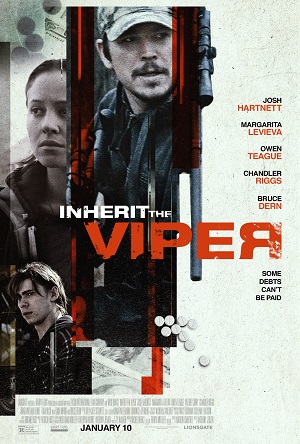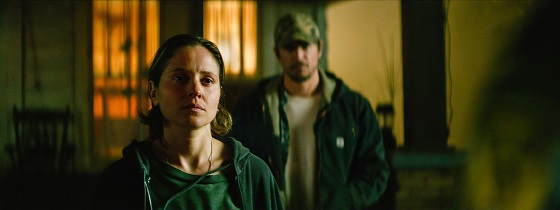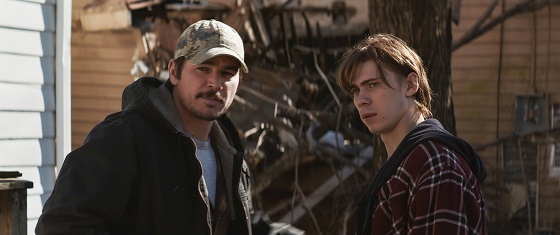

[Rating: Minor Rock Fist Up]
A postmodern southern noir piece that has its feet planted firmly in 2020 America’s opioid crisis, Inherit the Viper taps into a vein of despair and small-time hustling that doesn’t often get much attention. A sort of redneck Godfather, the movie explores the ways that legacy is defined in the most trying of circumstances, and is interested in the simultaneous burdens and blessings of family. Not everything lands, to be sure, yet enough of it does to engender some interest in rookie director Anthony Jerjen, who has crafted a very taut, engaging, and genuine picture with all of this.
Set in a fading Appalachia backwater that’s surviving on life support by way of a handful of local businesses and a mill that’s seen better days, the film introduces the audience to Josie Riley (Margarita Levieva), who spends her days selling pills to the locals. Working with her brother, Kip (Josh Hartnett), the pair feed the addictions of what’s left of their community, and while they suffer recriminations about their role in the town’s disintegration, there’s a chicken and egg scenario at play, here. Is the town wasting away because the Rileys feed it drugs, or do the drugs offer solace to an already-perished community that has long since passed the point of no return?
Josie is in the latter camp, and clings to a family identity rooted in their long-deceased and oft incarcerated father, who the script implies started this “family business.” Kip is less committed, and while he’s knee-deep in distribution himself, a pregnant wife and conscious that’s operating on at least half-capacity is pulling him towards a new life. When Kip and Josie’s younger brother, Boots (Owen Teague), makes a play to get more involved in the family’s operations, a crisis point emerges between the older siblings, and hard decisions must be made.

Jerjen wisely keeps the focus of the story narrow and centered on the family drama bubbling up within the Riley clan, eschewing B-plots and unnecessary backstory. The film has some action, including a very well-staged shootout in the second act, yet the strength of Inherit the Viper lies in its quiet moments, when things slow down enough to allow the characters to interact one-on-one. Too often, rookie directors get tunnel-vision for narrative, and sacrifice opportunities for character growth in service to the larger story.
Nothing could be further from the truth here, however, especially for Levieva, who gets some of the most powerful moments in the film. The movie teases a vast ocean of guilt and regret swirling like a tempest inside of Josie that’s only held at bay by her commitment to this idea of family and legacy, yet the walls are closing in on her. Kip’s pregnant wife, the circling authorities, and the need to fix the mess that Boots gets them all in strain her ability to keep the toxicity building up within her in check, and the moments where Inherit the Viper pause to showcase this are among its best.
Hartnett does fine work as the head of the family, and Teague is believable as the in-over-his-head younger brother with more gumption than smarts, yet again, this is Levieva’s movie. Bruce Dern pops up a few times as the owner of a local bar whose only real function in the script is to monologue with thematic intent, and he does fine with that, yet none of it is really needed. Dash Mihok also appears a couple of times throughout the picture as a local cop respecting an informal detente with the Rileys, and with just a few lines, he expresses more about the shared history of this community and Josie’s place within it than all of Dern’s work combined.

Jerjen crafts some exquisite shots, with the automobile sequences especially well-designed and executed. Though clearly produced on a budget, the visual aesthetics don’t betray any monetary constraints, and give Inherit the Viper a polished, professional look. And while there are a few scenes early on that could have benefitted from a bit more light, one gets the sense watching the film that the visual composition is indeed a measured choice, as this is a world that’s been robbed of color, warmth, and vibrancy.
That said, the script does need a bit more work on the “where” and “why” of things. Although it is mentioned several times that Kip and Josie don’t have any other choice bit to sling pills, this is never demonstrated in any meaningful way. Kip has a day job, and it’s never made clear why Josie and Boots can’t follow suit; and while the film implies that the town they’re in, important as it is to their family identity, is failing, there’s not much in the script to illustrate this in a way that justifies the central conceit of the picture. Though not rich, it’s shown early on that the family has enough money to continue funding their bulk drug purchases, so why not use that to start fresh somewhere else?
These questions don’t derail the film, but they do nag at the story enough to leave it feeling somewhat incomplete. Opening this week, Inherit the Viper is a slick, well-crafted journey into the heart of an opioid-ravaged America that is disappearing in pockets day by day, week by week, year by year. With strong performances across the board, and the patience to develop its characters (albeit at the sake of the narrative, at times), the film is a promising entry for a director making his feature debut.





Comments on this entry are closed.